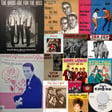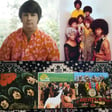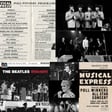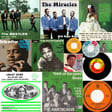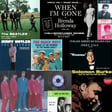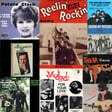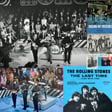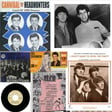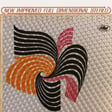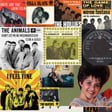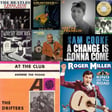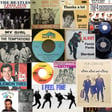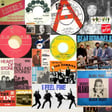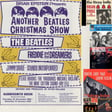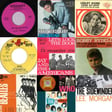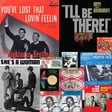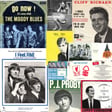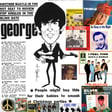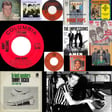Become a Creator today!Start creating today - Share your story with the world!
Start for free
00:00:00
00:00:01

November 1964 (side A)
Sixty years ago, Melody Maker took John Lennon, Ringo Starr and George Harrison out on a blind date. Sixty years later, Marv, Kit and I tag along. All this, and the first half of the UK charts for November of 1964! Support this podcast at the $6/month level on patreon to get extra content! Create your podcast today! #madeonzencastr
Recommended
Transcript
The Beatles' Motivation Mantra
00:00:00
Speaker
the Beatles had this chant John Paul and George and probably then Stuart and Pete had this chant when things weren't going well which in their world wasn't very often because mostly it was an upward trajectory but nonetheless sometimes you know a bit of a bad night or the gig we you know didn't work properly or the amps broke or whatever I say where are we going fellas and they'd go to the top Johnny and I say where's that fellas and they say to the top of most of the Papa most I said right and we'd also cheer up i'd say where are we going fellas and they go to the top johnny i'd say where's that fellas and they say to the top of most of the papamos and i'd say right and we'd all sort of cheer up
00:00:49
Speaker
Welcome to Side A, the British charts for November of 1964.
November 1964: A Beatles Chart Break?
00:00:55
Speaker
This is going to be the first month, really, since we've started where there has not been a Beatles song on either side of the charts. Wow. I didn't realize that, but of course, this won't last long. We're getting another Beatles song in December.
'Blind Date' Song Reactions
00:01:11
Speaker
I'm Ed Chin. I'm Kid O'Toole. And I'm Martin Quibbell.
00:01:15
Speaker
Our feature this month, Melody Maker used to have a back page item called Blind Date where they would call in pop stars or pop stars when they were in the Melody Maker offices, would come in, they would play records for them and not tell them who the artist was and just get immediate reactions from them.
00:01:36
Speaker
Yeah, I think this is great. I kind of wish they'd bring this back. I love these, as they would say today, hot takes. You get some unfiltered opinions. It's very definitely not a Jukebox Jury. They were on their best behavior on Jukebox Jury here. they say whatever they want to say. That's for sure. And because well some of these songs none of us have heard before we're gonna play along and do our own little version in between some of these songs not all 22 because in December of 1964 they did one from John, they did one from Ringo, and they did one from George. We're gonna do the John and the Ringo this month and hold over George till next month.
00:02:17
Speaker
Yeah. Otherwise, we'd have a box set of topper bows. We will give our opinions using a yeah two phrases ah that I'm sure you will pick up on immediately.
00:02:30
Speaker
All right, so onto Ringo's list. The first song on Ringo's list was Leader of the Pack by The Shangri-Laws, which we've covered and we even had a Halloween super cut on it. What does Ringo have to say? I don't like the song and it won't sell. I don't think so anyway. This wreck is a load of rubbish. Turn it off. All right. that You'll get you a couple more impressions from me, but not too many. I'm not Sam Wiles. No.
00:02:58
Speaker
I'll bet Kit is happy with Ringo's assessment of Leader of the Pack. and Oh, yeah. I was happy with many of his opinions, in fact, and I wish we could get him on the show now and play some songs for him and get his opinions, because this is very much like what we do, except we're not as savage. Do you know what? That'd be a great idea. Get Ringo on to Tuppermost. Yeah, wouldn't that be great? Well, he'd sooner do that than do a Beatles podcast. That's true. Yeah, maybe we've got a shot at it.
00:03:28
Speaker
I'll give him a shout. So then we have Candy and the Kisses, which we've talked about with ah the 81. He said about that. Hard to hear the voice with the backing so loud. Don't know who it is. A new American group? Don't think it'll be a hit. Sounds like a one record group to me, which actually wasn't far off. Nice though, I quite like it. And then on to Jack Jones, who we actually just lost recently, I should mention. R.I.P. Dear Heart, which he says, it's nice, but another that won't sell. I think I know the voice, but I can't put a name to it. American, isn't it? I wouldn't buy it. Not bad, but that's all I could say. What else is there to say? OK, Ringo. And then we have Billy Fury with I'm Lost Without You. Of course, we've had Billy Fury many times on here. He says having a clue who it is, but it's a great record. It's great, you know, to hear the English sound getting so American. And it's a good backing except for that woman's screeching voice.
00:04:32
Speaker
and Sounds a bit like Johnny Ray. I like it, but I can't see it selling. Maybe bottom half of the pop 50. And then he comments that he likes the trombones on it. You might as well turn it off. It doesn't really interest me at all and it won't sell. You're going to hear it won't sell a lot as we read these.
00:04:50
Speaker
Next we've got We Will Others by Sandra barrt Barry. b Ringo said, it's a completely nothing record and I don't think this will do anything at all. Sounds like an English tambourine player as well. No, it doesn't do anything for me. Take it off! What does an English tambourine player sound like, I wonder? That's exactly what I was thinking. How did he know he was English? And was it a green tambourine?
00:05:17
Speaker
Alright, next bar is Ecstasy by Lee Curtis and his All-Stars. This sounds the most like one of our reviews, I think. Yes. This is a record by Benny King. Rubbish compared with the original. I don't think this will sell anything either. And what about that terrible guitar solo? I don't like this at all. Turn it
John Lennon's Candid Critiques
00:05:37
Speaker
off. I can't stand listening to it any longer.
00:05:40
Speaker
I don't know who it is and I don't want to know any more about it. It's terrible. Who was it? Looks at the record label. Oh dear, Lee Curtis. I know him as well. That was embarrassing. Yeah.
00:05:58
Speaker
Whoopsie. All right. Oh, mom by the daylighters. Oh, Mom, by The Daylighters. Ringo's not very happy about these songs, or is he? Oh, here we go. The only drag is that it's got the same beat as Can I Get a Witness, and everyone's browned off with that. Browned off, nobody says that anymore. It's good, though. What does that mean, by the way? Yeah, what does that mean? Irritated. Thank you. Translator. It's good, though. It moves, and it's great to monkey, too. It's that dance move. Yeah, it's a dance move.
00:06:30
Speaker
Yeah. So he likes it. Yeah. Although he said earlier, being good, it won't sell. All right. OK. Yeah. OK. Like, well.
00:06:45
Speaker
Here we go with the next one. Yeah. 625 special by the Bob Miller Orchestra. Ringo recognises it as a theme tune for a TV show. The trombones are good. I like trombones. Are there 77 of them? No. 76 trombones more, not 77. 76. Thank you. yeah Get it right.
00:07:09
Speaker
Very important. Zero out of five from half. You might as well turn it off. It doesn't really interest me at all and it won't sell. He liked the trombones though. Yeah. So what's his problem? Does he like Riker, you know, with his trombone playing?
00:07:29
Speaker
A Star Trek reference here. Oh, thank you. Now you're the translator. All right. So now onto our first entry in there. Ringo reviewed Thunder and Rain by Alan Dean and his problems.
00:07:54
Speaker
I'm out.
00:08:04
Speaker
Don't you know the sun sets when we pass?
00:08:23
Speaker
Well, let's see. I got through about 10 seconds of it. get I paused at 30. She did better than both of us because I was up to 19. Wow. Well, I was trying to get the fuller picture of it.
00:08:36
Speaker
yeah you know And so Ringo's review of it, I think Marv and I definitely agree more than you do, although I'm not sure. This is another group doing a honeycombs. It's too fast to be any good. Sounds as if he's been given a quarter of an hour to make a record. There's just nothing good about it. Let's have it off.
00:08:57
Speaker
Next! Ringo doesn't like the next one much better either. The next record that Ringo reviewed was Goodbye Charlie by Pat Boone, which was from a film, by the way. To throw out a Beatles reference other than Ringo reviewing it, that film not only starred Pat Boone, but co-starred Tony Curtis, who would be on the Sgt. Pepper cover. wow So what Ringo said, I liked the rhythm, a sort of jazzy waltz type thing. It won't do anything.
00:09:26
Speaker
I know that voice. Wait a minute. Pat Boone? Okay. Good night, Charlie Boone. Oh, wordplay from Ringo. Wow. All right. The last record from Ringo. And we also did our little blind date with this record. It is If You Love Him by Joni Summers. Joni Summers, not Jamie Summers, not Buffy Summers.
00:09:57
Speaker
Not on Zoomers. We all got most of the way through the 35 seconds we allotted to listen to this song. Do you have anything to say before we play our instant reaction to it? I don't know if we're going to completely agree with Ringo on this one. yes We shall see. I address this song to every girl in love.
00:10:52
Speaker
I liked her voice. I thought it was, I was really hanging in there for the introduction. Very typical girl group lyrics of the time. Nothing groundbreaking. But I think her voice saves the day. I actually will probably go back and listen to this entire record. Yeah, I think I would too.
00:11:11
Speaker
The intro bit I liked because of the jazz chords that that they've got in there, a seventh and that it sounds like. And then when it starts general, it's got a decent girl group melody to it that you could almost imagine the chorales doing. Alright, so what Ringo said was, I don't like it. It's another one that won't sell. I know I keep saying that, but it's true. Don't know who it is, and you get the feeling the trumpets are getting winded trying to keep up with her. No, I don't like it at all.
00:11:50
Speaker
I agree with Ringo to it more. The opening is really nice. Her voice is really good. It's really pretty sweet. But then it kind of goes into a pop girl group thing. And there I agree with Ringo. Yeah, he actually said that she was doing
The Humor in Music Reviews
00:12:03
Speaker
this too fast. I agree to a point. All right. The week of December the 5th, John did a blind date on the back page. John's reviews. It started with Jeannie with the light brown lamp by the shadows, which we have covered.
00:12:18
Speaker
John was good. He knew immediately. Is this the shadows? You can tell them a mile off. There are a couple of good bits, Paul. He means the guitar solos. John returns, shut up. This is my blind date. It's the sound they used to get and much better than all that rhythm and onion stuff. Rhythm and onions. Which we have also previously covered. This is competent. So John was not a fan of rhythm and greens, huh?
00:12:44
Speaker
but I love he said, this is competent. They had their reason to not like the shadows. It does make you wonder though, you know, with that comment that he shouted off screen to Paul, you know, it makes you wonder whether they shouted that to each other in the late 50s when they'd be sharing girls, you know, when they were, you know, this is one my blind date, shut up.
00:13:05
Speaker
oh oh right more All right, All right. Moving on. I'm going to throw in a little impression again, and it's going to offend Kit slightly. Uh-oh. The second song John reviewed was Make Him Mine by Susan Maughan. Again, John gets it right off the bat. That's not Susan Maughan, is it?
00:13:26
Speaker
oh I don't like her voice at all. I didn't even like that great big hit, Bobby's Girl. You can take get off and put that down too. She seemed nice and all that, but I don't recognize her voice. A good looking bird, but beep. And there really was a beep in this video we found with the transcript. And I guess you can guess what the beep is. Yuck. All right.
00:13:54
Speaker
Third, John is reviewing What Good Am I Without You by Marvin Gaye and Kim Weston, which we've also covered. What he says is, it sounds like pride and joy upside down to me. Take it off. Again, take it off. Even though we are quoted as liking everything from Tamala, this is too ordinary for me. I've got that about 800 times in various LP versions.
00:14:16
Speaker
mean yeah yeah I can kind of see, but I don't, I think we, we don't really agree with that. No, I think that's a little harsh. And then the last one that I'm going to read, how many more times by the T-bones, another great band name, British. yeah Not one of those Irish mobs, is it? It's a drag unless something happens soon. It's a drag anyway. Turn it off. So, you know, you were complaining about Ringo. Ringo at least liked bits and pieces and he liked a couple of the records all the way. John doesn't like any of these.
00:14:47
Speaker
there Okay. kit Okay. He doesn't get much more positive from there, I hate to say, folks. Next one is, I could easily fall in love with you by Cliff Richard. Now, I have to admit, I agree with this first statement. He says, I can't believe it. He seems to have a record out every day. That's true. It seems like every show we do always with new Cliff Richard.
00:15:11
Speaker
well ah Now, this part I don't get. He says, well, it's not as good as one-way pendulum. So then he says, yeah, it's too smooth. It should do well in France. It sounds a bit country. Is country the new fave rave? I don't know what to say, really. Okay, good night, Cliff. That's enough. Then he really digs in.
00:15:33
Speaker
I think it should help the pantomime along. His records are too Christian for me, but he's a good lad and his mother should be proud of him. A couple things here. Paul did get a little interjection in here as well when John was talking about what he liked. Paul says, you got to say way what you mean. You mean the end of the middle eight. So I guess.
00:15:53
Speaker
They'd heard this record before. And the other thing is the pantomime was a reference to pantomime because Cliff Richard and the shadows were in pantomime that season. That's where the genie with the light brown lamp song came from. Oh, right. That sounds right. Okay. Aladdin in the genie. Okay. Yep.
00:16:11
Speaker
That's right. Next, we have Heartbreak Hill by Fats Domino. Now here, John gets a little more positive. He says, oh, it's great. I love him, Fats. But then he says, this won't be a hit, especially with that sax bit. I listened to it all night at a party. Okay, here's where he gets a little salty, because you know it's Fats and you don't really listen.
00:16:32
Speaker
It just goes on and on in the background and it's nice like that. That's the reason why people don't buy his singles. He's making the wrong kind of song. I think he means, like, for this time period. Anyway, I'll keep that one if I can. So that's somewhat positive. Now... Oh, much more positive than he is about the next one. Exactly. And this kind of breaks my heart, because this is, I've fallen in love with a snowman by Millie, of course, meaning Millie Small, and I kind of have a soft spot for her because, you know, it's Millie Small, it's Ska, you know.
00:17:05
Speaker
Okay, here we go.
John Lennon's Eerie Prophecy
00:17:07
Speaker
Sounds like a Christmas offering. Oh, that's old Millie. I mean, young Millie. I mean, middle of the road Millie. I don't really like it. I suppose that if she jumps around with it on the telly, it might be a hit. I'd like to hear this in the middle of summer. But anyway, her mom should be proud of her. Poor Millie. Well, Paul was a little bit more interested in the record. He at least said, well, it's a good kids record.
00:17:33
Speaker
I'm not saying it's a top record, but yikes. Okay, and this is one that we actually listen to. The Three Bells by Brian Poole and the
00:18:19
Speaker
I'm out and 31. About the same place in 33. Exactly. 33. I got two seconds last with you guys. Not unpleasant, but it's also not all that good. It's Brian Poole singing A Christmas Carol in a sappy kind of way, and I don't like the arrangement. Don't get me wrong. I love Christmas songs.
00:18:42
Speaker
but I do. i'm I'm not, you know, one of those people that says, eww, Christmas songs. But this one was pretty sappy. You know, Christmas songs can be sappy, but this was not sappy in a good way. I mean, the lyrics do not really evoke a warm, fuzzy kind of feeling that that you want to hear out of a Christmas song. I mean, this just is not memorable. I mean, from the bit we've heard, this gets a, yeah, not her most for me. Take it off.
00:19:09
Speaker
Take it off. So it's more slappy than sappy for you then. There you go. I like that. Yes. It's a not a most for me as well. It's just, I don't know where else to go with that one. We'll see what John Lennon had to say about this. This one he said, I'd sooner have it by the French ones.
00:20:05
Speaker
So after the French ones, Paul then goes, say who it is, it's Brian Poole. And then John responds, yeah, that's right, it's Pat Boone. Then Paul responds again, no, I said Brian Poole. So then he says, oh, it's Brian Poole. I thought you said it was Pat Boone. Oh well, Brian Poole, yeah. Another one who knocked us off the top of the hit parade. His mother should be proud of him as well. It will probably be a hit, get it off.
00:20:34
Speaker
You know they knew that Brian Poole was the band that beat them out of Decca. Notice he doesn't say anything about it. No, o but I think some pointed remarks there. So, all right, now on to Marv. Next up, we've got to Hurt Smile by Timi Yoro. And John says, is it Jackie Wilson?
00:20:55
Speaker
No, it's Georgia's favourite. Timi Yoro. Is that John being sarcastic? Why is this being reissued? Has she died or something? This isn't a hit but I quite like it. I'd never buy it because I can hear it anytime at Georgia's place. I don't buy many records. I've just got the Hollies, Manfred Mann and the Animals eat LPs. The Animals is the only good one among them.
00:21:18
Speaker
coach Now John does make a snarky comment which, did given the way things have gone, is not great. After it was mentioned that Hashi died or something, John goes, well, you know, I'd like to see what happens when we sell our records after I die, and then I'll come back and be alive and collect the money. o Well, wow yeah unfortunate.
00:21:42
Speaker
Yes. Especially given the way that things have kind of gone in the Beatles world, you know? Yeah. We love now and then, but yeah, there's a little bit of that in there.
00:21:52
Speaker
Yeah. ah All right. Next we've got the song Now by Shirley Bassey. Sir John says, Frank Ifield? No. It's Shirley Bassey. Anything about clowns is written by Newall and Bricus.
The Harsh Reality of Christmas Songs
00:22:07
Speaker
Although I've had clowns in I'm a Loser and I'm not Bricus by a long kit. Okay. That's a nice saying. I might try and remember that one.
00:22:14
Speaker
You can take it off. Ooh, dear. I think John disliked it more than we did. Wow. That's brutal. Yeah, that was kind of nasty. Yeah, but John mentioning Frank Ifield, that alone is a great reason for this review. Yep. All right. Next, you've got Bulbles, Bangles and Beads by Buddy Greco. John's straight out of the gate with this one. Oh, I hate this song. Is it Buddy Greco?
00:22:38
Speaker
it Another one where John just recognizes it immediately. He's got it off the bat straight away. These singers all sound the same to us, like they say about us a lot. It's the same old arrangement and they go on and on. I suppose I'd better get a new middle of the road image. Tell all the people who are going to write to the back page to drop dead before they even start writing. Ooh, dear me. That's- Mic drop!
00:23:03
Speaker
Wow. Wow. John knew that he could say things that would get him in trouble. It's just sad that he wouldn't remember that. Wow. Wow. Wow. And then ah finally, John goes on to a song, Christmas Calling by Valerie Masters, which we're all going to listen to now and respond to.
00:23:58
Speaker
I got through about 22 seconds of it. Did I get to 30? Something's going around there. Yeah, you're not almost all the way through. Yeah. And I got a little bit further to 32. So what did we all think? This is another not good Christmas song. I did not like the singer's voice and the arrangement is just ick.
00:24:20
Speaker
Sorry, Valerie. Yeah, this is my, as they say these days, hot take. Hot take. To me, this is just sort of a, hey, we need to write a Christmas song like a factory written Christmas song. All right, let's get the bells in. Let's get the strings. Okay, let's just throw in every cliche we can. Snow check, fire check, tree, you know, it's Christmas time again. Joy, happy, happy.
00:24:49
Speaker
Yeah, that's good. That's a Christmas song.
00:24:56
Speaker
The 1964 version of getting AI to do it for you. Exactly. Very good, Marv. That's pretty much it. I mean, this is just a factory produced. I'll get a pleasant quotes girl singer. or I hate that phrase, but that's what it sounds like. A factory produced Christmas song. Marv? It's pretty by the numbers. Although saying that, I'd be tempted to try and learn it and then see if I could do it with another singer and do a different version of it and see if I can make it any better. More work for Peter Jackson.
00:25:30
Speaker
Well, yeah, you can do it. ah Save me the work. Well, you're nicer than I am. Well, yeah you're both nicer than I am. so And I have a suspicion all three of us are nicer than John Lennon was. Yes. Oh, yes. John's even more brutal than we were. No, it's that Christmas crap again. I'm not even going to guess who it is. Get it off.
00:25:52
Speaker
I think we were a little nicer. Well, none of us are John Lennon, but... No. John has said he wants to take Susan Maughan off ah for a little evening together. He doesn't like the Valerie Masters tune and he has got the readers of the Backpage of Melody Maker writing him for his thoughts on Buddy Greco. Way to go. All right. Do you think all these Christmas songs that he disliked ah helped him to then create what I think is the best Christmas song that's ever been written. Could be. I mean, maybe he you know listened to these ones that he thought were too sappy and all in thought, I want to write a song that I would want to hear. That is a song that's what I think Christmas is really about. And you know and that would make me throw up. Well, ah certainly the war is over if you want it part. The rest right I'm not sure about.
00:26:47
Speaker
And we will be back next month with George's opinion on the December charts.
November 1964 UK Chart Overview
00:26:53
Speaker
We're gonna probably do ah more than the four reviews from us playing Blind Date along with George. But it will be a bit of an abbreviated feature because, well, we got a lot of songs in December. So on to the UK charts for November of 1964.
00:27:14
Speaker
We start with the week of the 4th of November. At number one is Sandy Shaw's version of There's Always Something There to Remind Me, which goes from number one to number one to number two to number seven. At number two is Oh Pretty Woman by Roy Orbison, which moves from number two to number two up to number one for a week on the UK side, then down to number four.
00:27:35
Speaker
All right, and then we have Sha La La by Manfred Mann, which is number 11, goes up to number five, then to number three, and then back down to number five. Number 12, How Soon by Henry Mancini, which then goes up to number 11, then back down to 21, and then stays at 21.
00:27:55
Speaker
Number 14, I'm Crying by the Animals, which then goes down to 22, then to 29, and then down to 37. Number 17, I Won't Forget You by Jim Reeves, which then goes down to number 19, then 23, and 33. At 18, he's in town by the Rockin' Berries. It goes up to 14, then 6, and then up to number 3. And then at number 21 we've got Goldfinger by Shirley Bassey, which goes from 21 to 24 to 26 to 28. At 22 we've got Together by PJ Proby, which goes from 22 to 35, then to 48 and then comes out of the charts. At 23 we've got Three Little Words by The Apple Jacks, which goes from 23 to 27 to 37 and then out of the charts.
00:28:48
Speaker
Mm, I think we've got some more songs coming in soon. At 24, we've got Reach Out For Me by Dionne Warwick, which goes from 24 to 31 to 39 and then to 47. There do seem to be a lot of songs that are out of the charts this month, and Hard Day's Night is out of the charts. This is the first time really since, I would guess, like November of 1962, where we have not had a Beatles song on either the US or UK charts.
00:29:18
Speaker
Yeah, this is gonna be a Beatles free show. Crazy. Relatively. Relatively, yeah. At number 25, maybe I know by Leslie Gore, which moved from 25 to 34 to 45, then out of the charts at 31. Marian Faithfuls, as tears go by, which moved from 31 to 47 and out of the charts.
00:29:39
Speaker
at number 32, new to the UK side, but we did discuss it on the US side.
Questioning the Authenticity of 'Tokyo Melody'
00:29:45
Speaker
Ain't that Love and You Baby by Elvis Presley, which moved from 32 to 17 to 15 to 19. I do just want to say that opening reminds me of that AMC Let's Go to the Movies trailer an awful lot.
00:29:59
Speaker
if Hadn't thought of that.
00:30:16
Speaker
At number 33, Summer is Over by Frank Ifield, which moves from 33 to 37 and then out of the charts. At number 35, Tokyo Melody by Helmet Zacharias, which moves from 35 to 21 to 12 to 9. I know we discussed this at some point in the past,
00:30:37
Speaker
During this year, I just don't remember why. We haven't had any other helmet Zacharias songs. Maybe it was something in relation to foreign songs or television songs, but this was the theme to the 1964 Tokyo Olympics that were held in Japan. I think this was a hit due to the circumstances. It very much feels like something that was written for use on television. It's in a pentatonic scale, somewhat cheesy drumming.
00:31:32
Speaker
a little bit like the Ain't That Loving You Baby Let's Go To The Movies opening. It's not a terrible record, but it's not really a good one and not really one I would want to listen to. Sorry to say, it has a dated kind of sound. Since it's an Olympics theme, it has to have a very dramatic, big sound to it. But I thought the background singers were kind of syrupy sounding. It also has, I think, a very fake, and I'm using this word on purpose. I'm really using it purposely, oriental sound of the time. Well, that's the pentatonic scale thing. If you just play the black notes on the piano, you're playing a pentatonic scale and more or less in any combination, you're going to get that so-called oriental feel. At the very least, it's not that riff. It is evocative of it, and they do use a gong in there. Exactly. I mean, there's nothing authentic about this. Why they didn't use a contemporary Japanese composer to create this Olympic theme, that would have worked out a lot better.
Exploring 'Now We're Through' by The Poets
00:32:39
Speaker
I mean, this is just Orientalism of the time. I mean, as you said, it could have been worse. It could have been that stereotypical riff, but still not that great. Your comment about it being dated is funny because, according to The Guardian, this was an ethereal, vaguely futuristic piece which must have made the hairs on the next stand up back in 1964. The first year Olympic action was beamed back by satellite from the other side of the world. Hmm. Futuristic is not what I would use to describe the song. Thankfully, this is not the sound of the future.
00:33:14
Speaker
So there's a rumor that this was a very big selling record. I mean, obviously it it hit the charts, but it did not sell 13 million copies. And supposedly it featured one of the world's greatest violinists on it. But guess what? There's no violin on this record. There sure isn't. Helmet would record three cover versions of Beatles songs, Obla Dee, Obla Da, Something, and Can't Buy Me Love.
00:33:39
Speaker
on a record called, I'm not going to attempt to pronounce it in German, well-known dance orchestras play Beatles melodies. You want to try that in German, Marv? Marv. Well, that's about as good as we're going to get. I don't know how authentic that is. Maybe it's about as authentic as the Tokyo melody. Apologies to any of my German friends for the pronunciation. Have I got that wrong?
00:34:08
Speaker
It's a long time since I've used you better than I could do at number 36 bread and butter by the new beats 36 to 49 to out. So yeah, they're just a bunch of records leaving the charts this week yeah at number 37. I love you because by Jim Reeves, which moved from 37 to 39 to 46 to out.
00:34:29
Speaker
At number 39, now we're through by the poets, which moved from 38 to 32 to 31. This was a Scottish band that Andrew Luke Oldham discovered. He was traveling to marry his girlfriend, his 18 year old girlfriend, and the poets were on the cover of a magazine and they were dressed in pirate type shirts, the very flowery jackets and the big collared shirts like johnny kid and the pirates used to wear yeah.
00:35:34
Speaker
This song is a blue song. It's a fairly standard blue song, although it is slightly a proto psychedelic record. It's a pretty good track. that It's got a haunting backing. So after Andrew Lugaldum signed them, he brought the song back and played it for John Lennon. And John, after listening to his promotional copy, only said, well, that's effing weird.
00:35:59
Speaker
Hmm, he's right. Yeah, I didn't like this quite as much as you did it. I mean, I don't know if I'd say effing weird. I mean, it freaked me out that much or anything, but I'll give them credit. I mean, it is a bit different for the time. It is Rolling Stones asking that it's a little blues change, particularly in the Mick Jagger-like weed vocal. I could kind of see Mick Jagger singing this. Somewhat psychedelic sound with, I'm assuming that's a keyboard in the background, but I just didn't find it that interesting. The record just didn't do anything for me, didn't really take off. You know, I was waiting for something to happen and it just really didn't. Just wasn't really for me, but I'd given credit for doing something a little different for 1964. But I could kind of see why the band didn't really make an impact.
Comparing 'Black Girl' Covers
00:36:51
Speaker
all that much well that's why i said proto-psychadelic it's definitely not psychedelic but it's got tinges of it yeah exactly it's interesting as an experiment right i really don't like the lead singer's voice michigan would have been way better Oh old yes, absolutely. There's elements of the song that sort of remind me of things that eventually Brian Eno would do on Here Come The Warm Jets, with the experimentalism and using the traditional blues style but then turning it on its head. He'd turn on its head types of music and genres towards the beginning of his career. But that's about all that I find in it other than that. I don't really find anything
00:37:33
Speaker
interesting other than the fact that they're just trying something different. agreed But I can see why Andrew Lueg Oldham would have been attracted to them, although I don't know why just from the picture without having heard any things like, I gotta sign that band.
00:37:50
Speaker
pirate shirts cool But I don't want to be a pirate, as Grey Seinfeld once said. ah At number 40, is it true by Brenda Lee, which would be out the next week. At number 41, black girl by the four pennies, which would go from 41 to 36 to 31 to 27.
00:38:39
Speaker
This is a traditional folk song. Leadbelly is probably the best known and original version of the tune. Well, original in as much as it was a traditional folk tune, which he may have been the first one to put it down on record. As performed here, it's a nursery rhyme with pop backing. Nice guitar and drums. It's not bad, but it's not all that good. The vocal is too constrained and the harmonies don't fit nearly as well as they should. A reinterpretation is Nice, it's interesting, but this never quite makes it over the top. The version of the song that most people might know, Nirvana played it on their Unplugged, ah both show and record. Kurt Cobain's vocals work much better with this tune than these do.
00:39:35
Speaker
I'm going with the cold wind blows
00:39:41
Speaker
I thought this was a weird cover and ah and a kind of a weird song ah for them to choose to cover. It's a great song. It's strange that they call it Black Girl. I mean, I know it better for, you know, where did you sleep last night? That's what I know it better as or in the pines. I think it's also been called that. It's supposed to be this haunting song. Leadbelly obviously to me is the definitive version. and And as I said, it's just absolutely haunting and borderline eerie.
00:40:32
Speaker
And Nirvana did it justice. And I'm not the world's biggest Nirvana fan, to be honest with you, but I thought their version was stunning. And as you said, Ed, Kurt Cobain's voice just fit it perfectly. You could just feel his pain as he was singing this. And then here comes this version, which sounds almost happy. yeah say it's It's almost like a nursery rhyme. Exactly.
00:40:55
Speaker
That's just wrong. and You can't turn this into a pop song. And I don't have problems with reinterpretations and know if it's right for the lyrics. But the mood of this, listen to the lyrics.
00:41:10
Speaker
yeah I mean, this isn't a happy-go-lucky tune. I also think it's not very well recorded. if I don't know if you guys noticed, as it goes into the instrumental section, the volume dipped a bit. It was just strange, so I didn't think it was really even well recorded. Other harmonies were nice, but just an incredibly strange song to cover and a strange version.
The Kinks' Influence on Punk
00:41:33
Speaker
That's actually a bad edit that you've just noticed there. Because to me it sounds like it staggers when it goes to the solo. To me that's almost a sign of the fact that they've put two different recordings together to me.
00:41:46
Speaker
Oh, okay. Maybe that explains it. Because I thought that was jarring. So did I. So I went back and I listened to that a little bit again, I rewound, and it loses a tenth of a beat or something in there. It's just slightly out. If somebody's put two different tapes together, if they've spliced two different recordings, that's a telltale to me. And can you imagine the producer was like, eh, good enough.
00:42:08
Speaker
Yeah. He's good enough. Nobody's going to notice. Can you imagine all of those people who still moan about the multitude of edits in She Loves You? They sound absolutely perfectly smooth as opposed to this thing. Exactly. Yeah, I'm definitely not fond of this. My favourite version is the lead belly version because it's got the mood absolutely correct and even the old-fashioned recording and production of the lead belly helps to put the song's emotion behind it. There's a thing behind the lyrics. They've got a point there, they're saying something about the racial situation, and that's being lost in this because this song is making it happy-go-lucky. People listen to the melody, they're not listening to the words, and it's one of those things where they'll do that and they'll just think, oh, it's a happy song, blah, blah, blah, blah, blah, this, that, and the other. And only when they look at the words themselves will they think, oh, that's not what it's about.
00:43:03
Speaker
But it takes away the whole meaning of the song to reinterpret it this way. Right on. At number 42, our first classic, and we got at least one other classic, maybe two other classics this month on the UK side, All Day and All of the Night by the Kinks, which would move very quickly from number 42 to number 18 to number seven to number two.
00:43:27
Speaker
The record starts off great. Love those drums. The fuzz guitars are really out front here and the piano is deceptively complex. It's all the same pieces from You Really Got Me, but cranked up to 11 here. The interesting thing is Ray Davies wanted this to have an it's so easy sort of bop, bop, bop, bop feel. And it's like, how would that have worked?
00:43:52
Speaker
What can you say? This sounds just as good today, 60 years later. And it's interesting, Burt Bacharach called it neurotic. And I thought, yes, that's right, because as you listen to this now, this is punk. This is absolutely the start of punk, the sound of Ray Davies' voice. I was thinking about the songs that We've been listening to particularly the bobbies.
00:44:24
Speaker
these smooth vocals. And here comes Ray Davies, who of course can sing, but he brings that delivery, that snarling delivery. Is he a pitch perfect, beautiful singer? Maybe not, but he's got that delivery that works with these songs. He is, in this case, the perfect ah picture of frustration.
00:44:52
Speaker
you know maybe a little flat at times on purpose because he's getting across the girl I want to be with you all the time all day and all night I mean he's absolutely frustrated
00:45:05
Speaker
kingin
00:45:36
Speaker
This is a punk vocal. It's not meant to be perfect. And of course that riff, that riff that's just a bit distorted, that guitar solo, one of the great guitar solos, the pounding drums.
00:46:11
Speaker
You know, we talked earlier about Tokyo Melody saying that is not the future. This is the future. And in fact, Ray Davies said that if this record were made today, it would sound like Green Day or some metal band in regards to the quote you had.
00:46:27
Speaker
The reason Ray Davies wanted it clarified that it was Burt Bacharach who called the record neurotic. There is a quote running around which claims Ray Davies said that all day and all of the night was neurotic, youthful, obsessive, and sexually possessive. Ray says, nope, that wasn't me. I was a neurotic 19 year old at the time, but I'd say I was a sweetheart, although I'm sure others would say I was appalling to work with.
00:46:55
Speaker
My point is The Clash could have recorded this. The Ramones could have recorded this. This is the sort of song I was hinting at when we were talking with Shell and saying that I could see a direct correlation between this and the work that would be done with The Damned in the late 70s. All Day and All the Night would inspire the punk sound, I think, of the mid 70s. Absolutely. So we've already discussed to a degree you've really got me. So then you've gone from there And then it's almost like and you double down on the big guitar sound by going into All Day and All of the Night. Yeah, All Day and All of the Night. Yeah, that that was, I suppose, the next step up from there. um And no, I've always been being on, as I said, sound. And and i I like cutting a lot as long as it fit into the song, you know, since there I was producing. um And that that certainly worked out.
00:47:53
Speaker
extremely well as did um ah my generation, you know, later on and and tired of waiting and all those other songs came pretty much in a row and by that by which time the kinks and the who and I were pretty much on the same page ah and i they knew what they were going to expect from me and I knew pretty much what I was going to get from them.
00:48:21
Speaker
I mean it's interesting that you'd work with the damned because sometimes when I listen to them you can almost hear a link or a line that that's there sonically that leads to them from the the big sound that you got with but the kinks and the who in the early 60s as well. You can almost hear that in their sound as well in the early days definitely. Well I'm i'm but now i'm glad you can because what I tried to do on every record I produce is to make it totally clear lyric wise. And as much as I can get out of this sonically. And so if that came through with the damned, I'm delighted that you said so. Thank you. What can you say about this? You know, there's so much energy in every aspect of this song. That live solo that Dave Davis just made up on the spot was just staggeringly wonderful.
00:49:16
Speaker
He made that up on the spot. Wow. I believe he made that up on the spot there and then and that's just amazing. That's even more impressive. I did not realize that. I like what Ed says as well about the drums. I think Bobby Graham's drums just starting it like that are just perfect as well. We do have some reviews from the US side of this record. The Billboard review is actually pretty straightforward. This is a potent entry Raw gutsy delivery is maintained along with that raunchy guitar sound. Now then, we've got the Cashbox review. A raunchy rocker that should flip the teeters. That's almost a bit calm for them, actually. Yeah. It's not a rakachacha. Oh, well.
00:50:04
Speaker
And Dave Davies also claimed, ah with regards to that solo, that this record was where he, quote, found his voice, unquote. Hard to argue there. And so playing on this record were Ray and Dave Davies, Pete Quaife, Perry Ford was on the piano, Bobby Graham was on the drums, and Johnny B. Great was doing those backing vocals.
00:50:24
Speaker
So Johnny B. Great is John Goodson, ah English musician, songwriter, and record producer. He was one of the original members of the Brotherhood of Man, the English band, and he co-wrote numerous songs for the Basity Rollers eventually in the 70s, including the classic Give a Little Love. Well, there you go. And we don't have any Beatles connections to Johnny B. Great, although maybe there are some. We'll find out next time if we find any.
Ringo's Iconic Slogan
00:50:51
Speaker
Yes. We will.
00:50:52
Speaker
We got one more guest coming out here. And this one, this one threw us for a loop too, man. We didn't know what to think of this at first. And the more, we we got completely schooled. We got schooled on early, early riff rock by this man and his band, his band the Kinks, all right?
00:51:18
Speaker
One of the original punks. There's three chords in those songs that have gone on to make every punk rock band feel good. All right? Please, a warm welcome for Mr. Ray Davies. All right!
00:51:40
Speaker
Yeah! You all right?
00:54:19
Speaker
At number 43, Have I the Right by the Honeycombs? So this is the last week in the charts for Have I the Right, which leaves from number 43 the next week.
00:54:31
Speaker
at number 44, The Wild Side of Life by Tommy Quickly and the Remo 4 which moved from 44 to 45 to 33 to 35. We talked about this record last week but we really only talked about Tommy Quickly last week. We wanted to bring it up again because of the Remo 4. The Remo 4 would become buddies of George Harrison and their song in the first place would appear in the Wonderwall film and actually be lost.
00:55:04
Speaker
until the reissue many years later. A psychedelic pop song in the first place has been likened by some commentators to George's track Blue Jay Way. Mass Out's sequence, the rediscovered recording, is the opening track in his 1999 director's cut of Wonderwall. Still not enough reason to watch the Wonderwall movie.
00:55:26
Speaker
ah The new mix was carried out by Paul Hicks. So that was some of our early Beatles or Beatles related work by Paul Hicks. The Remo 4 version was included as a bonus track on the Apple years reissue of Wonderwall music.
00:55:42
Speaker
So the Remo 4 were led by guitarist Colin Manley, and they were around during the cavern time and playing all all the same venues that the Beatles did in the early 60s. Then they actually even toured as one of the Beatles support acts in 1964. And Brian Epstein chose to manage them.
00:56:04
Speaker
Still the group just wasn't all that successful and found themselves without a recording contract by 1966. So part of the reason George gave them a little boost was they needed a gig. The players would show up.
00:56:21
Speaker
Again, on George Harrison's records, most notably, all things must pass. Tony Ashton is one of the keyboard players on both versions of Isn't It a Pity? cool Tony Ashton would go on to form Ashton, Garter, and Dyke, and George and Eric Clapton would play on the Ashton Gardner and Dyke record, I'm Your Spiritual Bread Man, under the names Sir Cedric Clayton and George O'Hara Smith.
00:56:55
Speaker
ah ah Who wouldn't know that they're made up names, really? so Cedric Clayton, that is Eric using another nom de plume from the Eddie Clayton group of made up names. And then, yeah, George has used George O'Hara Smith on many occasions, including the George O'Hara Smith singers. Yes. Do you prefer that name for Eric or the name that George used to give him? Old Clapper? The Old Clapper, yeah. c flapper yeah
00:57:27
Speaker
yeah I like the Eddie Clayton, or in this case, the Cedric Clayton. I like him quoting Georgia's old bandmate. Yeah. At number 45, when I grew up to be a man by the Beach Boys, which would go from 45 to 44 then out of of the charts.
00:57:45
Speaker
We mentioned this on the US side, at number 46, New to the UK charts, Dancing in the Streets by Martha Reeves and the Vandalas, which we all love, which move from 46 to 40 to 38 to 32.
00:57:59
Speaker
At number 47, the other Kinks record, You Really Got Me, and it's last week in the charts. At number 48, It Hurts to Be in Love by Gene Pitney, which moved from number 48 to number 46. At number 49, Do I Love You by the Ronettes, which would be in its final week in the charts. And at number 50, Come to the Dance by the Baron Knights in its final week in the charts. So bunch of records leaving the charts this week.
00:58:29
Speaker
Join us for more of the British Charts in Part B for November of 1964. See you then. Take care.
00:58:55
Speaker
There was a piece in the NME, a news piece, that said the top rank records. Remember when top rank had a record label? and They introduced an LP series next week that will be called Toppermost. And it's coinciding with their current advertising slogan, Toppermost of the Poppermost. Yes, and thought, they got it from somewhere. They saw that, they must have seen that in either the NME or record mirror or disc, record and show mirror as it was then.
00:59:23
Speaker
And they've taken it from there. They've obviously thought how stupid that is. How stupid is, it's one of those phrases that someone, an older person who doesn't understand teenagers comes up with a slogan that they think is going to be the hip slogan of the month. Topper most of the popper most.
